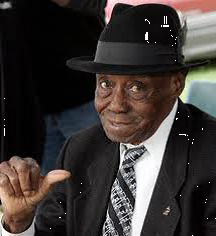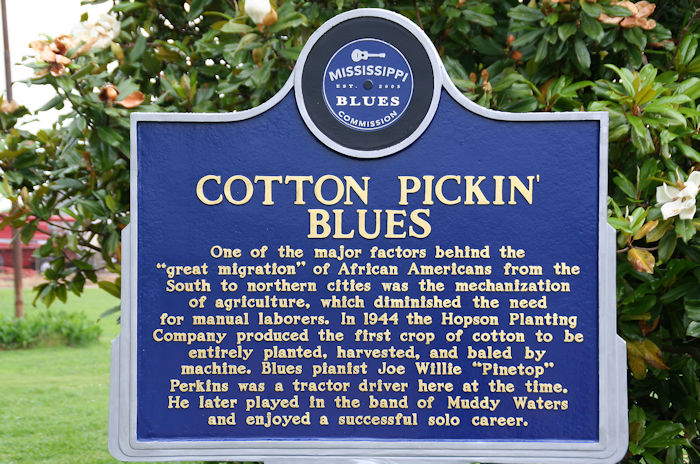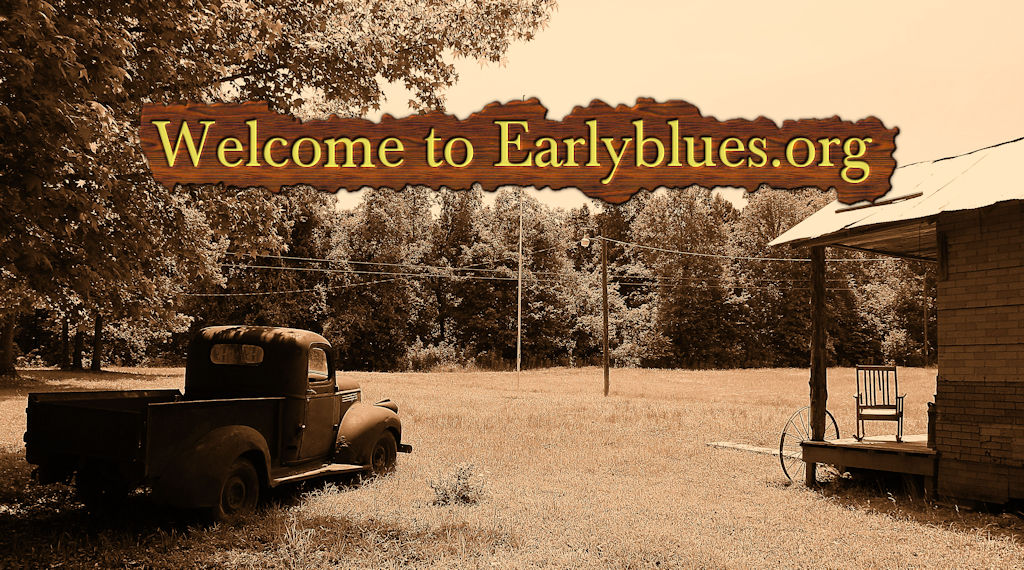‘Pinetop Perkins Obituary’ – by Keith Woods, from Tales From The Woods
Tales From The Woods raises a glass and says farewell to blues legend Pinetop Perkins who passed away aged 97 on the 21st March 2011.
 Born Joe Willie Perkins on 7th July 1913 in Belzoni, Mississippi, where his parents worked the land. Growing up on ‘Deadmans Plantation, Honey Island, Mississippi, where as a small child he learnt the rudiments of the guitar, becoming considerably proficient by the age of 13. Pinetop often said of himself in interviews that he had no schooling worth a damn. “I came up the hard way.” Soon he was playing the honky tonks of the localities along with house parties etc. By his late teens he was, unbeknown to himself, creating a development that would shape his later life and secure himself a place in blues history by building himself a piano virtually out of spare parts, tuning it with his guitar and would soon be teaching himself barrelhouse.
Born Joe Willie Perkins on 7th July 1913 in Belzoni, Mississippi, where his parents worked the land. Growing up on ‘Deadmans Plantation, Honey Island, Mississippi, where as a small child he learnt the rudiments of the guitar, becoming considerably proficient by the age of 13. Pinetop often said of himself in interviews that he had no schooling worth a damn. “I came up the hard way.” Soon he was playing the honky tonks of the localities along with house parties etc. By his late teens he was, unbeknown to himself, creating a development that would shape his later life and secure himself a place in blues history by building himself a piano virtually out of spare parts, tuning it with his guitar and would soon be teaching himself barrelhouse.
Throughout the 1930s he worked on a plantation near Clarksdale, Mississippi as well as playing the thriving blues circuit based around Indianola in the heart of that state’s delta land. As the decade gave way to the forties he teamed up with slide guitarist Robert Nighthawk, with whom he would record for the Chess label in Chicago, and harmonica player Rice Miller, later to become a legend and hero to countless white kids this side of the Atlantic during the glorious days of the early sixties blues boom as Sonny Boy Williamson where he would spend the next five years performing with and recording on the radio show out of Helena, Arkansas entitled King Biscuit Time.
A much reported incident in a bar in Helena led to Pinetop discarding the guitar in preference for the instrument for which he will be forever associated; stabbed in the arm by a young lady who had barricaded herself in the bathroom to protect herself from her crazed ex-husband where Perkins was meant to be having a quiet drink. The altercation cost him the tendons of his left hand which were so severely damaged he was unable to hold a guitar again forcing him to concentrate on his piano playing. It was this piano style that so strongly influenced Ike Turner and was very much the foundation of his 1951 Sun recording of Rocket 88 (I have to mention this as there are a few folks that will not know that this is the record generally associated with being responsible for the birth of Rock’n’Roll). Around the same period would find Perkins as a much in demand sideman working alongside the likes of Earl Hooker and Albert King.
Pinetop’s piano playing was heavily influenced by, and indeed taking the name for his own, Clarence Pinetop Smith, a piano player shot dead at the age of 25 who composed Pinetop Boogie Woogie which Perkins adopted and recorded for Sun Records in Memphis Tennessee in 1950, the area where he would remain for a considerable number of years, working with whoever gave him a job, until 1969 when Muddy Waters came a calling to replace Otis Spann in his band.
He would remain with Muddy for the next twelve years, where his legend grew through recordings for the Chess label, on occasions moonlighting in Howlin’ Wolf’s band. Our own Jools Holland would quote Pinetop as a very big influence on his style as has Dr John. It has been suggested Professor Longhair cited Perkins as well.
1978 would find him appearing in the Martin Scorsese directed documentary ‘The Last Waltz’ concerned with The Band quitting after sixteen years on the road. Appearing alongside Pinetop was Muddy Waters, The Band’s former guvnor in their previous incarnation as The Hawks, Ronnie Hawkins and their at the time present guvnor Bob Dylan along with many others.
Two years later Pinetop, along with the rest of the group, split from Muddy over a dispute with money which resulted in the aptly titled Legendary Blues Band. Thereafter Perkins recorded frequently as leader on albums After Hours [1988], Pinetop’s Boogie Woogie [1992]. In 1998 the album Legends, recorded with former lead guitarist with Howlin’ Wolf’s band Hubert Sumlin, was nominated for a Grammy. Several times during this period he was consistently voted best blues pianist in the W C Handy awards.
Come the new century, although he was willing to give up alcohol in his eighties, he refused to stop smoking which he had been doing since the age of 9, finally winning a lifetime achievement award in 2005 and further Grammys were forthcoming in both 2007 and as recently as February 2011. Well known for being a man of few words, I witnessed the legend several times both as sideman with Muddy Waters and as leader, most recently when he was 92 at London’s Camden Town Jazz Café. Back home he continued to play virtually up to the end, at Chicago’s west side Rosa Club before making his final move to Texas to perform consistently in the clubs around Austin. During his very long life he married and divorced once and is said to have four children.
Keith Woods
Further obituaries:

Commemorative Plaque at Hopson Plantation, Clarksdale.

